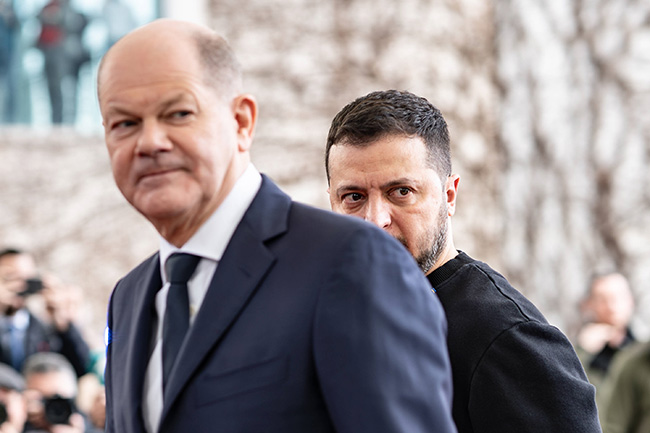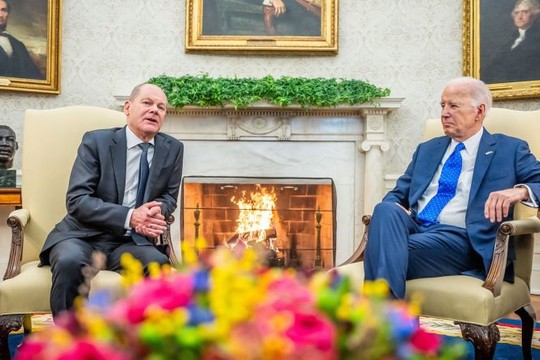German Chancellor Scholz (L) and US President Biden at the White House, Feb. 9, 2024
The veil has come off the western narrative — this war was never about Ukraine. The enemy image of Russia has become the cornerstone of NATO’s very existence and function, stresses M.K. Bhadrakumar, Indian Ambassador and prominent international observer.
The flow of finance to Ukraine is already ebbing and there is a pall of gloom among Ukraine’s cheerleaders in Europe after having discovered finally that Kyiv is not winning the war. The West’s proxy war without a clearly set war goal means that there is no exit strategy, either.
A Trump victory would badly expose the European partners. Plugging the funding gap by Europe is going to be highly problematic. The US has so far committed €71.4 billion, more than half of it in the form of military aid. Number two is Germany with €21 billion, followed by the UK with €13.3 billion. Norway comes fourth.
The paradox is, while the three largest European donors are all NATO members, it is only Germany who is a member of the European Union.
And Germany is not big enough to fill the gap left by the US on its own. But the biggest obstacle to a common European response is the lack of common ground between France and Germany. The special Franco-German relationship has largely become a historical artefact. The two EU giants are pursuing incompatible economic strategies — on fiscal policy and nuclear energy — and their economies are diverging, and so is their politics and defence strategies.
Chancellor Olaf Scholz has reoriented German defence co-operation away from France and towards the US. The power struggle between the EU’s two biggest powers that had its origins in the lack of chemistry between French president Emmanuel Macron and Scholz has turned into an antagonism manifesting as two different visions of the world.
Macron’s concept of “strategic autonomy”, which calls for Europe not to rely on outside powers in vital areas that could give them political leverage, is rubbing against Germany’s historical reliance on American military umbrella (which France does not require.)
After a meeting with Biden at the White House in Washington on February 9, Scholz said, “Let’s not beat about the bush: support from the United States is indispensable if Ukraine is to be capable of defending itself.” Scholz strongly advocated stepping up military aid to Ukraine, emphasising an imperative need to send out a “very clear signal” to Putin.
As he put it, “We need to show that he (Putin) can’t count on our support waning.” Scholz added: “The support we provide will be on a big enough scale and it will last long enough.” By hyping up the war-like atmosphere, Germany seeks to maintain the relevance and financial stability of NATO through the conflict in Ukraine.
Biden responded to Scholz purring like a cat showing pleasure. Biden will next host Poland’s President Andrzej Duda and Prime Minister Donald Tusk for a meeting in Washington on March 12. The US is re-energising its coalition with Germany and Poland for the next phase of Ukraine war.
France stands outside looking in, while Britain lies in coma.
Simply put, while Ukrainian president Volodymyr Zelensky’s delusion is that he can win this war, NATO’s delusion is that it will do whatever it takes. But the undertaker’s money is running out and further business depends on prolonging the war.
 German Scholz and Ukrainian Zelensky in a very anxious mood.
German Scholz and Ukrainian Zelensky in a very anxious mood.
The veil has come off the western narrative — this war was never about Ukraine. The enemy image of Russia has become the cornerstone of NATO’s very existence and function.
Certainly, taking orders from an undertaker is not in Germany’s interests. The noted German editor Wolfgang Münchau wrote recently about “a general disorientation in Germany that accompanies the geopolitical and social change” manifesting in the faltering economy, the de-industrialisation that is happening and the absence of a post-industrial strategy for the country as such.
Clearly, European interests lie in shouldering own defence and making peace with Russia so as to focus attention on the economy. Germans themselves are conflicted over this war. Scholz is not a man of charisma or of big ideas, Münchau noted, and German public no longer trusts him. But then, there is also “the deeper problem: it is not really Scholz. It is that Germany has become a lot harder to run.”
read more in our Telegram-channel https://t.me/The_International_Affairs

 10:47 18.02.2024 •
10:47 18.02.2024 •























